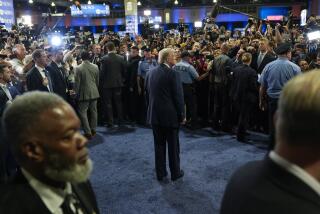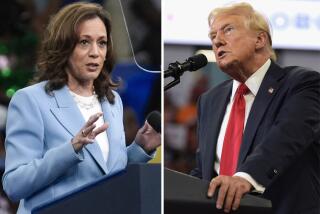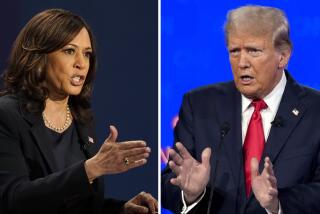Debate Uncertainty Hindering Clinton Schedule : Campaign: The Democratic candidate’s aides scramble to readjust his itinerary, awaiting a last-minute decision to face off by the President.
- Share via
COLUMBUS, Ga. — Bill Clinton may be winning the battle of public opinion over the stymied presidential debates, but the continuing uncertainty is taking a toll on the Democratic nominee--forcing him to cut down on campaigning and to frequently rejuggle his schedule with a wary eye on the chance that President Bush may change his mind and agree to a square-off on short notice.
In recent days, an increasingly frustrated Clinton has not only altered but in some cases curtailed his all-out, bone-numbing campaign--one that often begins early in the morning and does not end until a few hours before dawn.
“It frustrates him. He’d rather be out there campaigning hard every day,” conceded Bruce Lindsey, Clinton’s campaign director and a close friend. “A lighter schedule is not what he wants.”
Instead, Lindsey said, “We’ve had to keep (debate) dates available and free and uncluttered because every week we’re waiting for them to say whether or not they would participate the following week.”
Clearly frustrated himself, Lindsey added: “Sometimes things interfere with the best-laid plans. But we’ll be prepared--if there are debates.”
Vice presidential nominee Al Gore’s campaign has been similarly affected, said aides to the Tennessee senator.
A bipartisan debate commission had proposed three presidential and one vice presidential debates. The series was to have begun last Tuesday and continued next Tuesday, Oct. 4 and Oct. 15. The first two have been canceled because Bush rejected the format--one moderator rather than a panel of questioners--and refused to negotiate with the commission. He wants to use the 1988 format, which included three panelists and a moderator.
The phlegmatic campaign pace was evident Wednesday morning as Clinton, Gore and their wives kicked off a bus tour, their fifth since the Democratic convention in July.
In Columbus, a city with a huge military presence, an unusually subdued Clinton detailed his plan to convert “every dollar” taken from the defense budget into domestic investments, including rebuilding the infrastructure and providing job training.
In emphasizing his general campaign theme that a strong America begins at home, Clinton also said he would allow military personnel mustered out of the service who are just short of retirement benefits to earn credits toward retirement by performing public service in the civilian sector.
The bus trip itself got a lukewarm send-off. On a gray, muggy morning in Columbus, several hundred people waited listlessly. The local high school band was lackluster and the warm-up speakers were uninspiring, inexplicably leaving gaping minutes when no one was at the dais. A faulty public address system did not help.
When Clinton and Gore finally showed up--half an hour late--each delivered an uncharacteristically flat talk. Some in the crowd left while Clinton was speaking.
Undaunted, the Arkansas governor said he and Gore intend to press their campaign throughout Dixie, adding: “We’re competitive all across the South.”
Asked about Texan Ross Perot’s possible re-entry into the presidential race, presumably because neither Clinton nor Bush has addressed the federal budget deficit to his satisfaction, Clinton replied:
“It is simply not true that I haven’t addressed the problems. I’ve got a book out that goes into more details about most issues than his plan does.”
As the bus caravan progressed from Columbus toward Valdosta near the Florida border, both Clinton and Gore began picking up steam, seeming to draw sustenance from the enthusiastic if mostly small crowds along the way.
Lindsey said in an interview that he does not know whether the Bush campaign’s latest refusal to join the bipartisan Commission on Presidential Debates in trying to salvage the debates is a ploy to throw Clinton and Gore off stride.
“I don’t have any idea what their strategy is,” Lindsey said. “But if that is their strategy, I think it’s a poor one because, frankly, the American public wants debates. And this continual week-by-week refusal to participate is, in my opinion, hurting him much more than it’s hurting us. I think the American people understands who’s agreed to debate and who hasn’t.”
Meanwhile, Vice President Dan Quayle offered the GOP’s view of the debate standoff: He accused Clinton of ducking them. “I’m beginning to think that Bill Clinton doesn’t want a debate,” Quayle said aboard Air Force Two as he returned from campaigning in Texas and Oklahoma. “He’s sitting on his lead.”
Clinton’s partial campaign slowdown--freeing him to attend two recent football games in the span of 48 hours--is not “a cautious strategy” on the part of a candidate with a commanding lead in virtually all the polls, Lindsey insisted.
“Clinton would be out there every day campaigning as hard as he knows how--from as early in the morning as he could to late at night” if the debates weren’t up in the air, he said.
Wednesday’s Clinton-Gore bus trip through southwest Georgia, for instance, might have been longer, but its planned, 13 1/2-hour itinerary was dictated in part by the lingering possibility, however slight, that a presidential debate could still be held Tuesday in Louisville, Ky., campaign aides said.
Thus, Clinton was scheduled today to have the entire afternoon off from campaigning while in New York City, concentrating instead on briefings, debate-preparation and other meetings.
But by midday Wednesday, the debate commission canceled next week’s debate because Bush had refused to negotiate with it.
In an interview aboard Clinton’s jet late Tuesday night--hours after Bush rejected the commission’s latest proposals--Lindsey added:
“Here we are--Tuesday--the commission suggested a debate in Louisville. Obviously, we kept Monday available. We kept Tuesday available. And we kept other days lighter than you would schedule if you had complete flexibility.”
But with Bush’s continuing refusal to meet with the commission--his campaign insists on talking directly with the Clinton camp--the governor’s schedulers are scrambling to fill the time in Clinton’s schedule previously carved out for debate preparation.
“We will now try our best to fill those dates. But on short notice, you can send fewer teams out and do fewer sites than if you had a little bit more lead time,” Lindsey said.
“So we will campaign on most of these days. But we will not do what has been traditionally a Bill Clinton campaign--three or four events in a day,” he added.
Before too much longer, Lindsey added, Clinton will resume a full-bore campaign that assumes there will be no debates. But Lindsey would not specify when that might be.
“At some point, it’ll become evident that they’re not serious about it, that we need to go about our business and they need to go about theirs,” he said. “I can’t tell you what that point is. But if they propose a debate on Nov. 2, I doubt seriously that we’ll accept.”
The election is Nov. 3. Neither candidate is likely to agree to a debate on the eve of the election because if he made a glaring error he would have no time to recover.
Times staff writer John M. Broder contributed to this story from Texas.
More to Read
Get the L.A. Times Politics newsletter
Deeply reported insights into legislation, politics and policy from Sacramento, Washington and beyond. In your inbox twice per week.
You may occasionally receive promotional content from the Los Angeles Times.










